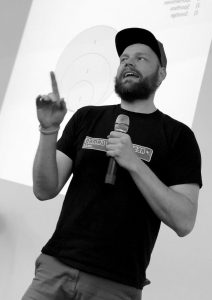 Rudolf Inderst studierte Politikwissenschaften, Neuere und Neuste Geschichte sowie Amerikanische Kulturgeschichte in München und Kopenhagen. Der an der LMU München und Universität Passau doppelt promovierte Spieleforscher leitet das Ressort Digitale Spiele bei dem Online-Kulturjournal nahaufnahmen.ch. Auf Twitter, Xbox Live und PlayStation Network findet man ihn als @BenFlavor.
Rudolf Inderst studierte Politikwissenschaften, Neuere und Neuste Geschichte sowie Amerikanische Kulturgeschichte in München und Kopenhagen. Der an der LMU München und Universität Passau doppelt promovierte Spieleforscher leitet das Ressort Digitale Spiele bei dem Online-Kulturjournal nahaufnahmen.ch. Auf Twitter, Xbox Live und PlayStation Network findet man ihn als @BenFlavor.
 Pascal Wagner hat einen M.A. in kultureller und kognitiver Linguistik sowie einen B.A. in Anglistik und Rechtwissenschaften an der Ludwig-Maximilians-Universität München absolviert. Seine Masterarbeit schrieb er über Lokalisation, Benennungsmotive und kulturelle Fixierung von Fantasieworten bei der Übersetzung digitaler Spiele aus dem Japanischen ins Englische und Deutsche. Er ist Gründer des Game Studies- und Wissenschaftskommunikations-Blogs languageatplay.de und Chefredakteur des Printmagazins für Videospielkultur GAIN – Games Inside. Auf Twitter ist er als @indieflock zu finden.
Pascal Wagner hat einen M.A. in kultureller und kognitiver Linguistik sowie einen B.A. in Anglistik und Rechtwissenschaften an der Ludwig-Maximilians-Universität München absolviert. Seine Masterarbeit schrieb er über Lokalisation, Benennungsmotive und kulturelle Fixierung von Fantasieworten bei der Übersetzung digitaler Spiele aus dem Japanischen ins Englische und Deutsche. Er ist Gründer des Game Studies- und Wissenschaftskommunikations-Blogs languageatplay.de und Chefredakteur des Printmagazins für Videospielkultur GAIN – Games Inside. Auf Twitter ist er als @indieflock zu finden.
Cortana – eine digitale Assistenz zwischen Datenschutz und Weltraumschlachten
Vortrag, Sonntag 20. Oktober, 14:30 – 15:00
„Die Geschichte wiederholt sich nicht, aber sie reimt sich.“ Dieser, irrtümlich Mark Twain zugeschriebenen Satz, kann in den Sinn kommen, wenn man sich die aktuellen Meldungen rund um Microsofts Sprachassistenz-Programm Cortana ansieht. Als nur eine Tageszeitung von vielen vermeldete die NZZ im August 2019, dass die persönlich geglaubten Sprachnachrichten von externen oder internen MitarbeiterInnen analysiert würden – vorgeblich, um die Gesamtqualität des Produktes zu verbessern.
Erstaunlich selten gehen dabei Medien auf die Tatsache ein, dass SpielerInnen der exklusiven Microsoft- und deren Xbox- Videospielkonsole-Shooter-Serie HALO diese Entwicklung hätten vorhersehen oder zumindest erahnen können. In der erfolgreichen Spielereihe unterstützt die weiblich gezeichnete, blauhäutige K.I. Cortana den Protagonisten der Action-Titel – den Master Chief – auch als Hologramm taucht sie dabei immer wieder auf. Doch Cortana verändert sich im Laufe dieser seit 2001 andauernden Geschichte: Aus einem anfänglich leicht erratischen Verhalten wird eine einflussreiche K.I. mit eigenem Willen und Agenda. Dieser Kontext unterstreicht und erweitert zugleich die Prämisse der diesjährigen FROG, dass Video- und Computerspiele „Abbilder kultureller Phänome“ seien: Eine digitale Assistenz transmutiert in für Kunden und SpielerInnen dysfunktionalen Kontexten im Sinne einer dramatischen Gesamterzählung.

 Florian Kelle, former chef, is a master’s student in the Game Studies and Engineering programme at Klagenfurt university. Prior to studying in Klagenfurt, he received a bachelor’s degree in British and American studies from Bielefeld University. His bachelor’s ‘If I Throw a Ball at You, You Could Wait until It Starts Telling a Story – A Ludo-Narratological Approach to Metal Gear Solid 3 and 4’, he concluded his first work on games. Beyond narrative and formalist approaches, he interested procedural literacy and the extra-academic communities of knowledge that arise around videogames. During a seminar he taught on horror in videogames, he has developed an interest in the archaeological implications of exploring games as virtual spaces. Currently, Florian Kelle is working towards his master’s thesis on conducting archaeology in and of videogames.
Florian Kelle, former chef, is a master’s student in the Game Studies and Engineering programme at Klagenfurt university. Prior to studying in Klagenfurt, he received a bachelor’s degree in British and American studies from Bielefeld University. His bachelor’s ‘If I Throw a Ball at You, You Could Wait until It Starts Telling a Story – A Ludo-Narratological Approach to Metal Gear Solid 3 and 4’, he concluded his first work on games. Beyond narrative and formalist approaches, he interested procedural literacy and the extra-academic communities of knowledge that arise around videogames. During a seminar he taught on horror in videogames, he has developed an interest in the archaeological implications of exploring games as virtual spaces. Currently, Florian Kelle is working towards his master’s thesis on conducting archaeology in and of videogames. Alexander Pfeiffer is recipient of a Max Kade Fellowship awarded by the Austrian Academy of Science to work at MIT with The Education Arcade. His research focus as a postdoctoral fellow at MIT is on blockchain technologies and their impact on game-based education and learning assessment.
Alexander Pfeiffer is recipient of a Max Kade Fellowship awarded by the Austrian Academy of Science to work at MIT with The Education Arcade. His research focus as a postdoctoral fellow at MIT is on blockchain technologies and their impact on game-based education and learning assessment. Katharina Bisset is geek, lawyer, translator and all-round creative. Early on in law school she focused on what interested her most: the legal implications of technology. She’s been working in IT-, IP-, Media-, and Data Privacy Law since 2002, whilst never giving up her side passions, whether that’s podcasting, photography, publishing fiction and writing the occasional line of code. With Nerds of Law, equally IT-minded lawyers are working on LegalTech in an effort to bring technology and lawyers together. In some moments of free time she writes on her dissertation about the Open Source Software License GPL. As Associate she advises clients in her areas of expertise, from software licensing contracts to privacy policies and, if necessary, representing them in court.
Katharina Bisset is geek, lawyer, translator and all-round creative. Early on in law school she focused on what interested her most: the legal implications of technology. She’s been working in IT-, IP-, Media-, and Data Privacy Law since 2002, whilst never giving up her side passions, whether that’s podcasting, photography, publishing fiction and writing the occasional line of code. With Nerds of Law, equally IT-minded lawyers are working on LegalTech in an effort to bring technology and lawyers together. In some moments of free time she writes on her dissertation about the Open Source Software License GPL. As Associate she advises clients in her areas of expertise, from software licensing contracts to privacy policies and, if necessary, representing them in court. Since Oct. 2016, Mahshid Mayar has been an assistant professor of American Studies at Bielefeld University. In her current position, Mahshid follows two broad lines of research; while she engages with the ‘blank’ in postmodern American literature (‘erasure’ and ‘blackout’ literature) for her second-book project, she also conducts research on digital games, where she theorizes the study of digital games and examines game titles that open dialogues on history and culture. Since early 2019, Mahshid has been a member of the central committee of the Arbeitskreises Geschichtswissenschaft und Digitale Spiele.
Since Oct. 2016, Mahshid Mayar has been an assistant professor of American Studies at Bielefeld University. In her current position, Mahshid follows two broad lines of research; while she engages with the ‘blank’ in postmodern American literature (‘erasure’ and ‘blackout’ literature) for her second-book project, she also conducts research on digital games, where she theorizes the study of digital games and examines game titles that open dialogues on history and culture. Since early 2019, Mahshid has been a member of the central committee of the Arbeitskreises Geschichtswissenschaft und Digitale Spiele. Richard Hahn hat in Tschechien, Spanien, der Ukraine, Slowenien und der Slowakei Deutsch als Fremdsprache sowie Landes- und Kulturkunde unterrichtet und zahlreiche Bildungsprojekte durchgeführt.
Richard Hahn hat in Tschechien, Spanien, der Ukraine, Slowenien und der Slowakei Deutsch als Fremdsprache sowie Landes- und Kulturkunde unterrichtet und zahlreiche Bildungsprojekte durchgeführt. Dominik Müllner is a teacher for English and History. During his academic studies, Dominik Müllner specialised on the pedagogical use of digital games in history classes and was also working as an expert for the “Federal Office for the Positive Assessment of Digital Games”. Furthermore, he is also working as a freelance trainer for educational play.
Dominik Müllner is a teacher for English and History. During his academic studies, Dominik Müllner specialised on the pedagogical use of digital games in history classes and was also working as an expert for the “Federal Office for the Positive Assessment of Digital Games”. Furthermore, he is also working as a freelance trainer for educational play. MMag. Dr. Alexander Preisinger ist Senior Lecturer am Institut für Geschichte der Universität Wien im Bereich Geschichtsdidaktik und Lehrer an einer Wiener HAK.
MMag. Dr. Alexander Preisinger ist Senior Lecturer am Institut für Geschichte der Universität Wien im Bereich Geschichtsdidaktik und Lehrer an einer Wiener HAK. Mag. Florian Aumayr studierte die Lehramtsfächer Latein und Geschichte, Sozialkunde und politische Bildung an der Universität Wien. Derzeit arbeitet er als wissenschaftlicher Mitarbeiter.
Mag. Florian Aumayr studierte die Lehramtsfächer Latein und Geschichte, Sozialkunde und politische Bildung an der Universität Wien. Derzeit arbeitet er als wissenschaftlicher Mitarbeiter. Felix Schniz is the director of studies and co-founder of the master’s programme Game Studies and Engineering at the University of Klagenfurt. He originally graduated as a Bachelor of Arts in English and American studies from the University of Mannheim, where he subsequently joined the master’s programme Cultural Transformations of the Modern Age: Literature and Media. With a thesis exploring the metamodern tendencies of the third-person shooter Spec Ops: The Line (2012), he concluded the programme with excellence. Today, Felix Schniz furthermore is a PhD candidate and research assistant at University of Klagenfurt, as well head of the Klagenfurt Critical Game Lab. The focus of his dissertation are experiential dimensions of videogames.
Felix Schniz is the director of studies and co-founder of the master’s programme Game Studies and Engineering at the University of Klagenfurt. He originally graduated as a Bachelor of Arts in English and American studies from the University of Mannheim, where he subsequently joined the master’s programme Cultural Transformations of the Modern Age: Literature and Media. With a thesis exploring the metamodern tendencies of the third-person shooter Spec Ops: The Line (2012), he concluded the programme with excellence. Today, Felix Schniz furthermore is a PhD candidate and research assistant at University of Klagenfurt, as well head of the Klagenfurt Critical Game Lab. The focus of his dissertation are experiential dimensions of videogames. Damian Stewart is a New Zealand-born Wiener. As well as being a veteran of the Austrian and New Zealand game industries, he has worked as a software engineer for interactive design, AR and VR projects, and as a professional artist and musician. Damian is currently studying toward an MA in Anglophone Literatures and Cultures at the University of Vienna.
Damian Stewart is a New Zealand-born Wiener. As well as being a veteran of the Austrian and New Zealand game industries, he has worked as a software engineer for interactive design, AR and VR projects, and as a professional artist and musician. Damian is currently studying toward an MA in Anglophone Literatures and Cultures at the University of Vienna.